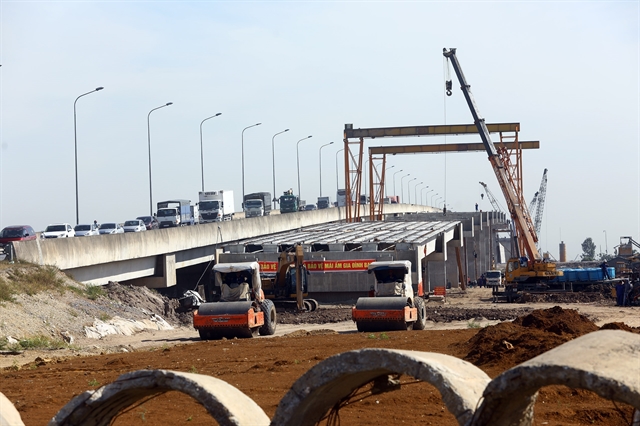Although local iron and steel prices have dropped, they are still at high rates, up 1.7 times compared to the end of 2020, causing investors and construction contractors to suffer.

Although local iron and steel prices have dropped, they are still at high rates, up 1.7 times compared to the end of 2020, causing investors and construction contractors to suffer.
On the international market, the price of steel rebar for October delivery on the Shanghai Future Exchange was traded at 5,687 yuan (US$877) per tonne on Monday, down nearly 5.64 per cent from the peak set in mid-May but surged 30.8 per cent since the beginning of the year.
As the global prices are higher, local steel producers can only raise their product prices, said Mai Minh Ngoc, director of Dong Hai Steel Company.
Nguyen Cong Chinh, an iron and steel dealer on Giai Phong Street, Ha Noi, told Tien Phong that his business has never been as difficult as this year. Every two-three days, steel prices rise and even climb twice a day.
"Sometimes, wholesale distributors informed me that the prices were up right after I opened the store," Chinh said.
"This year, steel prices have increased by 1.7 times so far."
In June, the local steel price quotes at around VND16,200 - 16,500, depending on products and enterprises, Viet Nam Steel Association (VSA) said. The price rose nearly 50 per cent year-on-year.
Earlier this month, many steel producers announced they would reduce steel prices by VND300 per kg, but the drop is not much, some dealers said.
The recent report from VSA showed that steel production reached over 2.5 million tonnes in June, down 12.21 per cent month-on-month. Steel sales were nearly 2.1 million tonnes, down 15.35 per cent compared to May.
Regarding construction steel, the report cited that the output was 847,279 tonnes in June, down 21.04 per cent month-on-month but up 5.2 per cent year-on-year. Meanwhile construction steel sales reached 655.046 tonnes, down 31.36 per cent monthly and 18.1 per cent year-on-year.
VSA expected that construction steel sales will struggle in July as the rainy season is coming and many construction projects are delayed due to the COVID-19 restrictions and losses because of higher steel prices.
Struggling to survive
The Viet Nam Association of Construction Contractors emphasised that all construction contractors faced difficulties, there is no way to solve them as the majority of private contractors used fixed price contracts, so they can't be changed, except for cases of force majeure.
Therefore, contractors have to deal with these problems by themselves, while state-funded projects must apply the material prices according to the notices of the Department of Construction but these notices are not up-to-date.
Tran Bao Thach, Deputy Director of Ha Noi Housing Investment and Development Corporation, told Viet Nam News that as steel price accounts for 30 - 35 per cent of a construction's value, and can be up to 40 per cent in big projects, contractors have suffered huge losses.
"For example, currently the market price of construction steel is VND18,000 per kg, while prices quoted by the Department in the first quarter is VND13,250," Thach said.
"We lost nearly VND5,000 per kg for a State public project. If the project uses 100 tonnes of steel, then we lose approximately VND500 million."
"Many businesses are going bankrupt while small companies don't dare to attend bids or do anything."
"Most projects now are stagnant."
Similarly, contractors building the North-South expressway also feel the heat from the rising iron and steel prices.
Nguyen Minh Khiem, General Director of 319 Corporation, which is constructing three key projects including Mai Son - National Highway 45, Cam Lo - La Son and My Thuan - Can Tho, said that as it is a fixed price contact, it is very difficult for the contractors as material costs keep rising.
Moreover, many provinces have not yet licensed enterprises to exploit land and waste dump sites, as well as required payment for dumping, creating more challenges.
"Now we are stuck between a rock and a hard place. If we don't work, the project will be behind schedule, but if we continue, we will lose money," Khiem said.
Meanwhile for private projects, if investors can't share the additional expenses from higher material prices, customers will be the ones to bear the burden.
"We can only wait for instructions from the Ministry of Construction to see if there is any adjustments in steel prices," Thach added.
After the Ministry of Construction issued an official dispatch directing provinces to report the situation of construction steel prices, recently, the Viet Nam Association of Construction Contractors sent an official letter to the Ministry of Construction proposing to adjust steel prices.
The association proposed that with the bidding package using State budget, the Ministry of Construction coordinated with the Ministry of Planning and Investment and the Ministry of Finance to issue a circular guiding the adjustment of iron and steel prices.
In addition, the Department of Construction is assigned to coordinate with the Department of Finance of provinces to adjust prices each month during the time when iron and steel prices spike.
For bidding packages using other capital sources, it is recommended that investors and contractors negotiate when there is a difference in price depending on contracts and construction volume. — VNS





